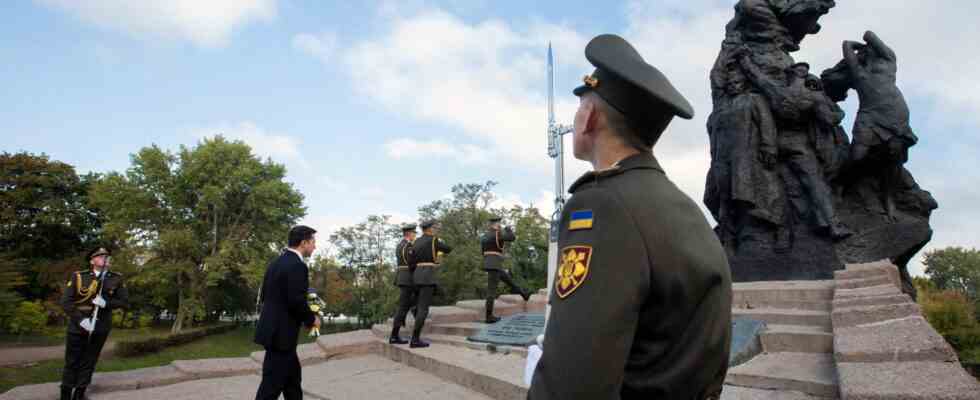Status: 01/27/2023 06:01 a.m
The National Socialists murdered at least 100,000 Ukrainian Jews in the Ukrainian city of Babyn Yar. Today more than ever, survivors and their descendants warn against forgetting.
Babyn Yar in the middle of Kyiv – where today pedestrians stroll in a park, thickly wrapped up, the largest mass murder of Jews took place during the Second World War.
At least 33,771 people were shot at this location within two days, and the Germans murdered 100,000 during the entire period of occupation. A large monument commemorates this time today. The stories that have taken place in this place tell of boundless cruelty.
Kaper Efim is a doctor in a synagogue in Kyiv. His father was born in Lubar near Kyiv in 1914. He and his ancestors were carpenters. From 1941 to 1943 he was a German prisoner of war. Many times he told his son about this terrible time.
After the mass shootings in Babyn Yar, the Jews were only superficially buried on the spot. The German occupiers then forced him and other Jews to burn the lifeless bodies of their fellow believers to cover up the crimes.
More than 1.5 million Ukrainian Jews murdered
One of those whom Hitler planned to be assassinated is the historian Borys Sabarko. He was six years old when the Wehrmacht invaded his homeland. He survived the Holocaust in the Sharhorod ghetto in south-western Ukraine.
“Every single place was hell,” he says. Everything was scary, people were “killed, shot, drowned, burned”. That’s how it was under German occupation throughout Ukraine. More than 1.5 million Ukrainian Jews were murdered during World War II. About 200 Sabarko has written books and essays about it.
More than 1.5 million Ukrainian Jews were murdered during World War II. The historian Borys Sabarko survived in the Sharhorod ghetto.
Image: Susanne Petersohn/ WDR
Remembering Holocaust to survive captivity
The director of the Ukrainian Center for Holocaust Studies in Kyiv, Anatolii Podolskyj, agrees that remembering the atrocities committed by the National Socialists is important. Especially now, since the start of the Russian invasion of Ukraine. Podolskyj tells of a young Jewish history teacher in Russian captivity in Mariupol. What he had previously learned about the Holocaust helped him persevere.
The teacher wrote to him, says Podolskyj: “If you have no bread, no place to sleep, if you could be killed at any moment – and I was in this state: It helped me to remember the people on their daily lives in the constant face of death. Their memories helped me survive Russian captivity.”
“Who do you want to denazify?”
The fact that the Russian government claims that it is fighting Nazis in Ukraine of all things leaves the scientist speechless. Yosef Assmann doesn’t understand that either. He is Rabbi at the Brodsky Synagogue. It is one of the few synagogues still in use in Kyiv. In 2000 it was reopened.
“When they say they’re coming to denazify us, I ask: Who exactly – the Jewish president? The Jewish community? Who exactly do they want to denazify?” Assmann asks. Ukraine is an open, multi-religious country.
The Russian government claims it is fighting Nazis in Ukraine. Rabbi Yosef Assmann has little understanding for this.
Image: Susanne Petersohn/ WDR
One last book about the Holocaust
But since the Russian invasion, many Jewish Ukrainians have left the country. Borys Sabarko is no longer in Ukraine either. At first he didn’t want to, but his daughter finally convinced him to come with them to Germany. They would have wanted to take his granddaughter to safety, but not without him.
Now he lives with his daughter and granddaughter in Stuttgart. It is a “terrible tragedy” that no lessons were learned from the horrors of World War II, says Sabarko. At the time, many only survived because they were convinced that the slogan “Never again” would come true. As it turns out, that is not the case.
Borys Sabarko is 87 years old today. He hopes that the war against Ukraine will end soon. Then he would like to return to Kyiv, to his homeland, with his daughter and granddaughter. There is a half-finished manuscript lying on his desk. He would like to publish one last book about the Holocaust in Ukraine – in a free Ukraine.

